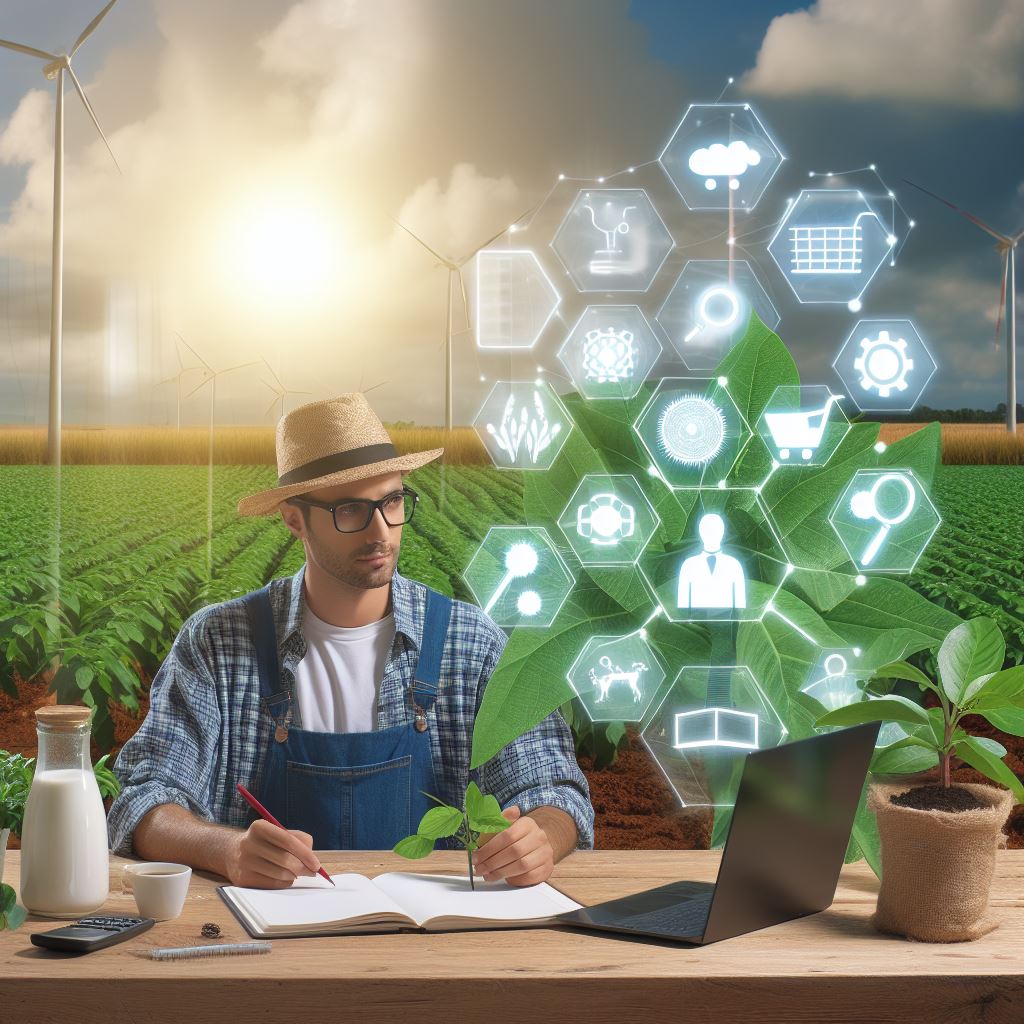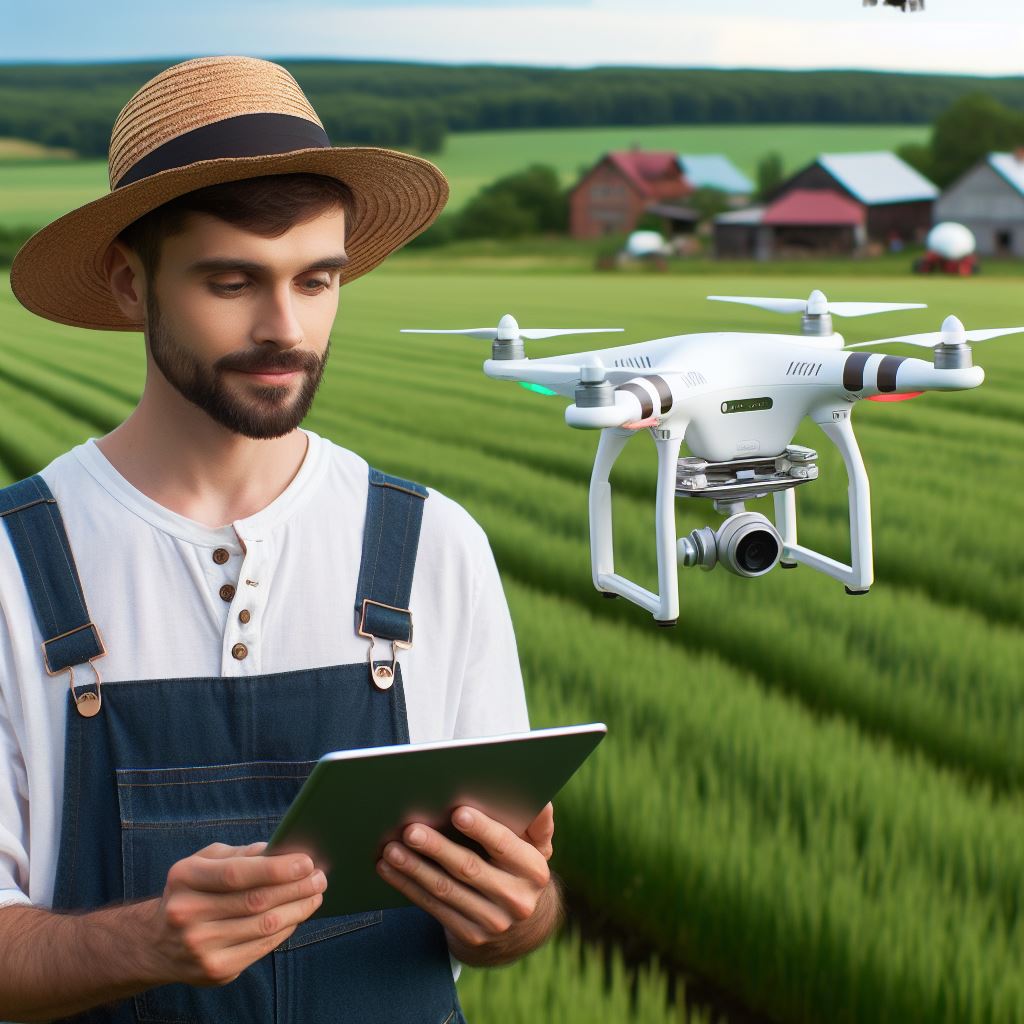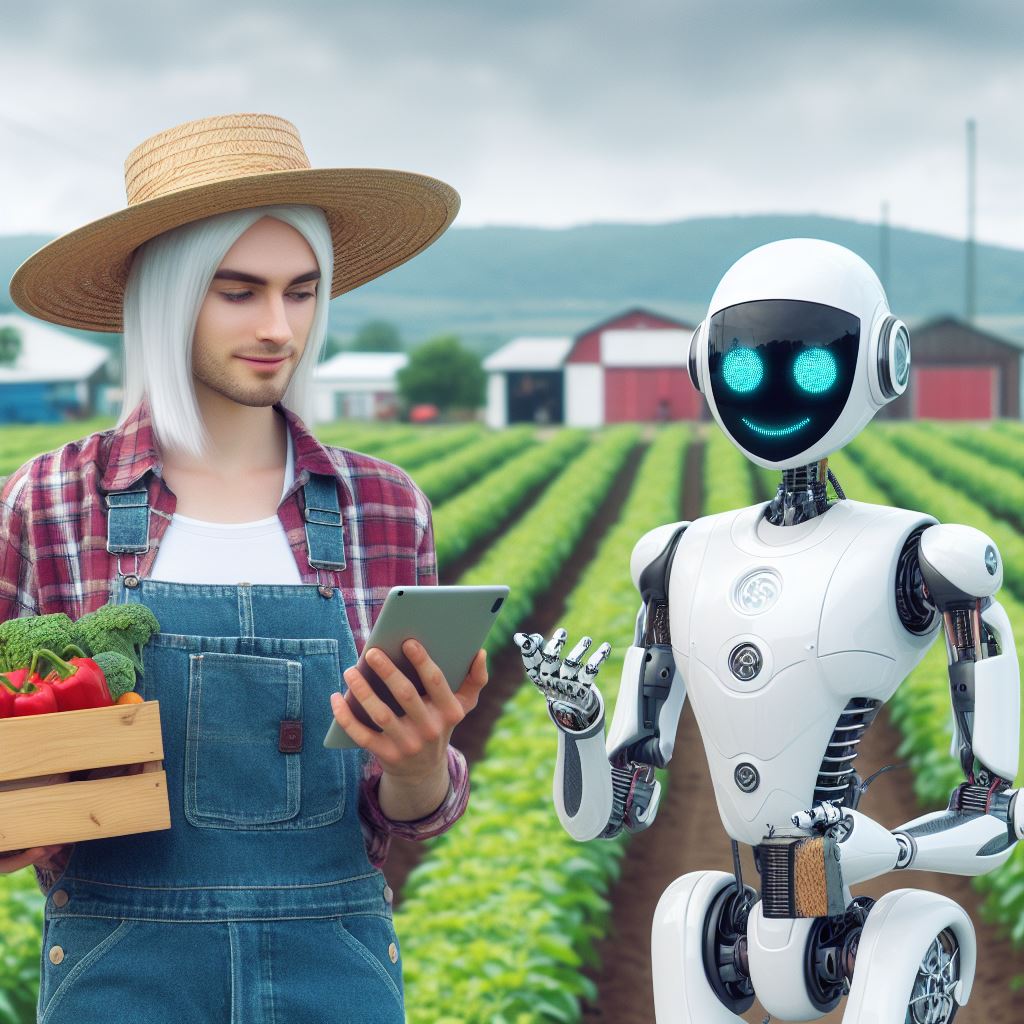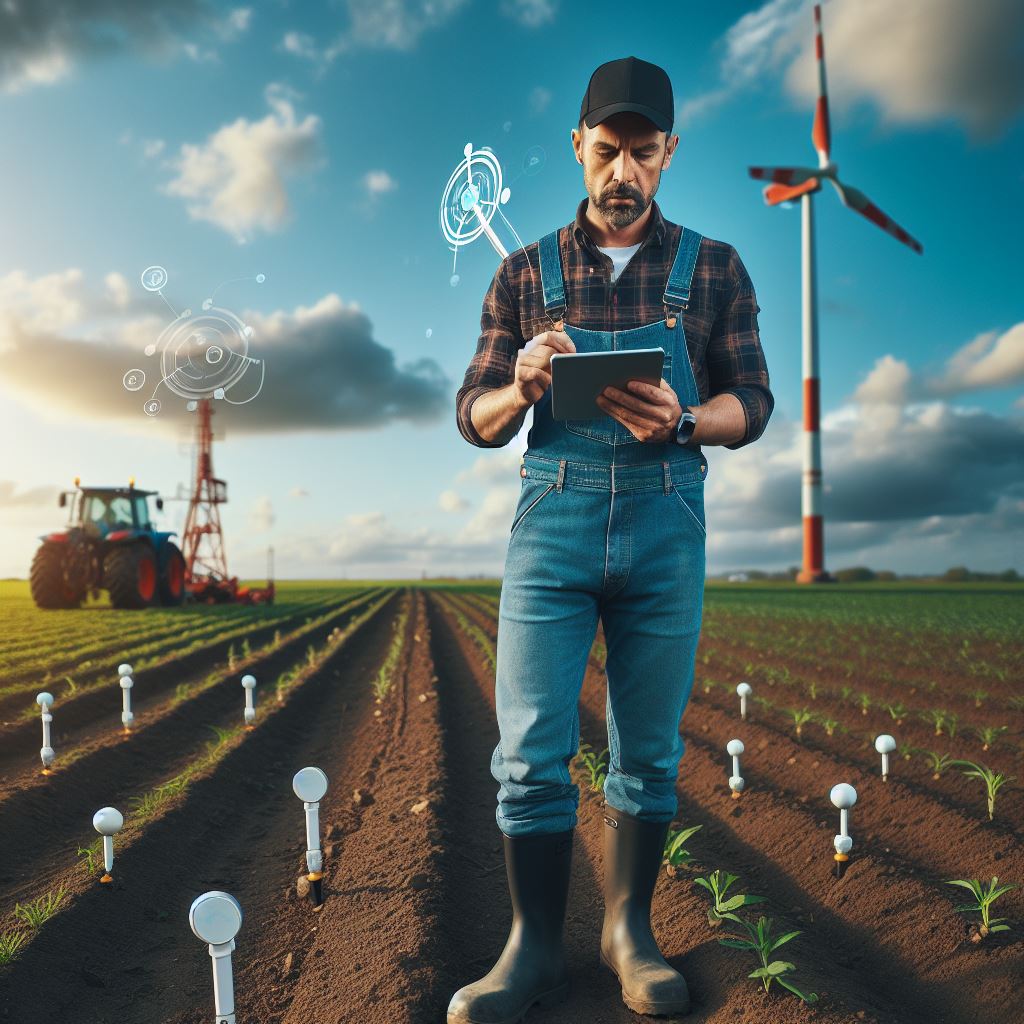Introduction
Over the years, agriculture has witnessed significant advancements with the integration of Artificial Intelligence (AI).
Explanation of the significance of AI in agriculture
AI has revolutionized the field by enhancing crop management techniques and optimizing agricultural processes.
Brief overview of why crop management is important
Efficient crop management plays a crucial role in maximizing crop yield, minimizing resource wastage, and ensuring food security.
AI technology enables the collection and analysis of vast amounts of data related to soil, weather conditions, and crop growth patterns.
With AI, farmers can make data-driven decisions regarding irrigation, fertilization, pest control, and harvesting.
By utilizing AI-based predictive models, farmers can anticipate crop diseases, pest outbreaks, and yield variations.
The implementation of AI-powered drones and robots reduces manual labor, increases precision, and improves overall productivity.
AI-based sensors and imaging systems enable farmers to monitor the health and growth of crops in real-time.
Through AI, farmers can optimize resource utilization, reduce costs, and enhance sustainability in agriculture.
Furthermore, AI facilitates precision agriculture techniques such as variable rate seeding and application of inputs.
In short, AI offers immense potential for the future of crop management in agriculture. It empowers farmers to make informed decisions and achieve higher productivity while minimizing environmental impacts.
Benefits of AI in Crop Management
Artificial Intelligence (AI) has proven to be an invaluable tool in revolutionizing the field of crop management.
Its implementation offers a myriad of benefits, propelling agriculture into a new era of precision and efficiency.
Transform Your Agribusiness
Unlock your farm's potential with expert advice tailored to your needs. Get actionable steps that drive real results.
Get StartedLet’s explore some of the advantages AI brings to crop management:
Improved Precision and Accuracy
- AI technologies can analyze huge volumes of data to provide precise recommendations for crop management.
- By utilizing machine learning algorithms, AI systems can identify patterns and make accurate predictions.
- This level of precision enables farmers to optimize the use of resources such as water, fertilizers, and pesticides.
Enhanced Decision-making Capabilities
- AI empowers farmers to make informed decisions based on real-time data and analysis.
- Through remote sensing and IoT devices, AI can monitor crop health, weather conditions, and soil quality.
- By analyzing this data, AI systems can provide actionable insights, enabling farmers to proactively address issues.
Increased Efficiency and Productivity
- AI-driven automation streamlines various tasks, saving time and effort for farmers.
- Robotic systems equipped with AI can perform precision activities like planting, spraying, and harvesting.
- AI also facilitates the optimization of irrigation systems, leading to water conservation and improved productivity.
Reduction in Labor-intensive Tasks
- AI technologies alleviate the burden of labor-intensive activities in crop management.
- Robots and drones equipped with AI can perform tasks that would traditionally require manual labor.
- This frees up human resources to focus on more complex and strategic aspects of farming.
In fact, the integration of AI in crop management offers a multitude of benefits, transforming the agricultural landscape.
Improved precision and accuracy allow for optimized resource utilization, while enhanced decision-making capabilities enable proactive farming practices.
The increased efficiency and productivity brought about by AI-driven automation contribute to sustainable agriculture.
Additionally, the reduced reliance on labor-intensive tasks and the consequent freeing up of human resources pave the way for a more strategic approach to farming.
Overall, AI is set to play a pivotal role in shaping the future of crop management, heralding new possibilities for increased yields, sustainable practices, and global food security.
Read: GPS in Farming: How It Revolutionizes Agriculture
Applications of AI in crop management
Crop management plays a crucial role in ensuring a successful and sustainable agricultural system.
As technology continues to advance, the integration of artificial intelligence (AI) in crop management offers numerous benefits.
Let’s explore some of the key applications of AI in this field.
Automated monitoring of crop health
- AI-powered drones and robots equipped with computer vision technology can automatically assess crop health.
- These devices capture images of fields, identify diseased plants, and provide real-time monitoring.
- By detecting issues early on, farmers can take prompt action, minimizing crop damage, and improving yields.
Predictive analytics for disease and pest detection
- AI algorithms analyze data from various sources such as weather patterns, soil conditions, and historical data.
- These algorithms can identify potential disease and pest outbreaks before they occur.
- Farmers can take proactive measures by applying targeted interventions, reducing the need for widespread pesticide use.
Optimization of irrigation and fertilization
- AI algorithms analyze data from sensors placed in fields to determine the optimal irrigation and fertilization schedules.
- They take into account factors such as soil moisture, weather conditions, and crop requirements.
- This precision-based approach reduces water and fertilizer waste while ensuring that crops receive optimal nourishment.
Remote sensing and data analysis
- AI techniques, combined with remote sensing technologies like satellites and drones, enable efficient data collection.
- These data sets are then analyzed to provide valuable insights into crop growth, health, and yield predictions.
- Farmers can make data-driven decisions about planting strategies, crop rotation, and resource allocation.
In essence, the implementation of AI in crop management offers immense potential to revolutionize agriculture.
From automated monitoring of crop health to predictive analytics for disease and pest detection, the benefits are undeniable.
Moreover, the optimization of irrigation and fertilization, as well as remote sensing and data analysis, empowers farmers to make informed decisions.
By leveraging AI, the future of crop management looks promising, with increased efficiency, reduced resource waste, and improved yields.
Read: Climate-Smart Farming Innovations
Case studies/examples of AI implementation in crop management
AI technology has revolutionized various industries on a global scale, and agriculture is no exception.
Crop management, in particular, has greatly benefited from the implementation of artificial intelligence (AI) systems.
This blog section explores several case studies and examples of AI in crop management and highlights its potential for the future.
Implementation of AI-powered drones for aerial monitoring
One significant example of AI integration in crop management is the use of AI-powered drones for aerial monitoring.
These drones can capture high-resolution images of crops, providing farmers with valuable insights into their health and growth.
AI algorithms analyze these images, identifying areas of concern such as pest infestations or nutrient deficiencies.
Farmers can then take targeted actions to address these issues, optimizing crop yield and minimizing wastage.
Integration of machine learning algorithms in precision farming
Another prominent application of AI in crop management is the integration of machine learning algorithms in precision farming.
These algorithms can analyze vast amounts of data, including weather patterns, soil conditions, and historical crop performance, to create predictive models.
Showcase Your Farming Business
Publish your professional farming services profile on our blog for a one-time fee of $200 and reach a dedicated audience of farmers and agribusiness owners.
Publish Your ProfileBy leveraging these models, farmers can make data-driven decisions about planting schedules, irrigation requirements, and crop protection strategies.
This leads to optimized resource allocation and increased productivity.
Use of AI-enabled sensors for real-time data collection
AI technology has also facilitated the use of AI-enabled sensors for real-time data collection in crop management.
These sensors can measure various environmental factors, such as temperature, humidity, and soil moisture levels.
The collected data is then analyzed by AI algorithms, providing farmers with real-time insights into the conditions affecting their crops.
By promptly detecting deviations from optimal conditions, farmers can take immediate corrective measures, maximizing crop health and minimizing losses.
Adoption of AI-driven robotic systems for precise harvesting
Furthermore, the adoption of AI-driven robotic systems has revolutionized precise harvesting in crop management.
AI-powered robots can identify ripe fruits or vegetables and harvest them with precision, minimizing damage and waste.
These robots use computer vision and machine learning algorithms to analyze crop characteristics, ensuring only the ripest produce is picked.
This not only improves efficiency and reduces labor costs but also enhances overall crop quality and reduces post-harvest losses.
In general, AI has brought significant advancements to crop management by enabling the implementation of various AI-powered systems.
From using drones for aerial monitoring to integrating machine learning algorithms in precision farming, AI has the potential to revolutionize the way crops are managed.
By leveraging real-time data collection and adopting AI-driven robotic systems, farmers can optimize productivity, reduce wastage, and ensure higher crop quality.
The future of crop management lies in embracing and harnessing the power of AI technology.
Read: Precision Ag: Revolutionizing Farms
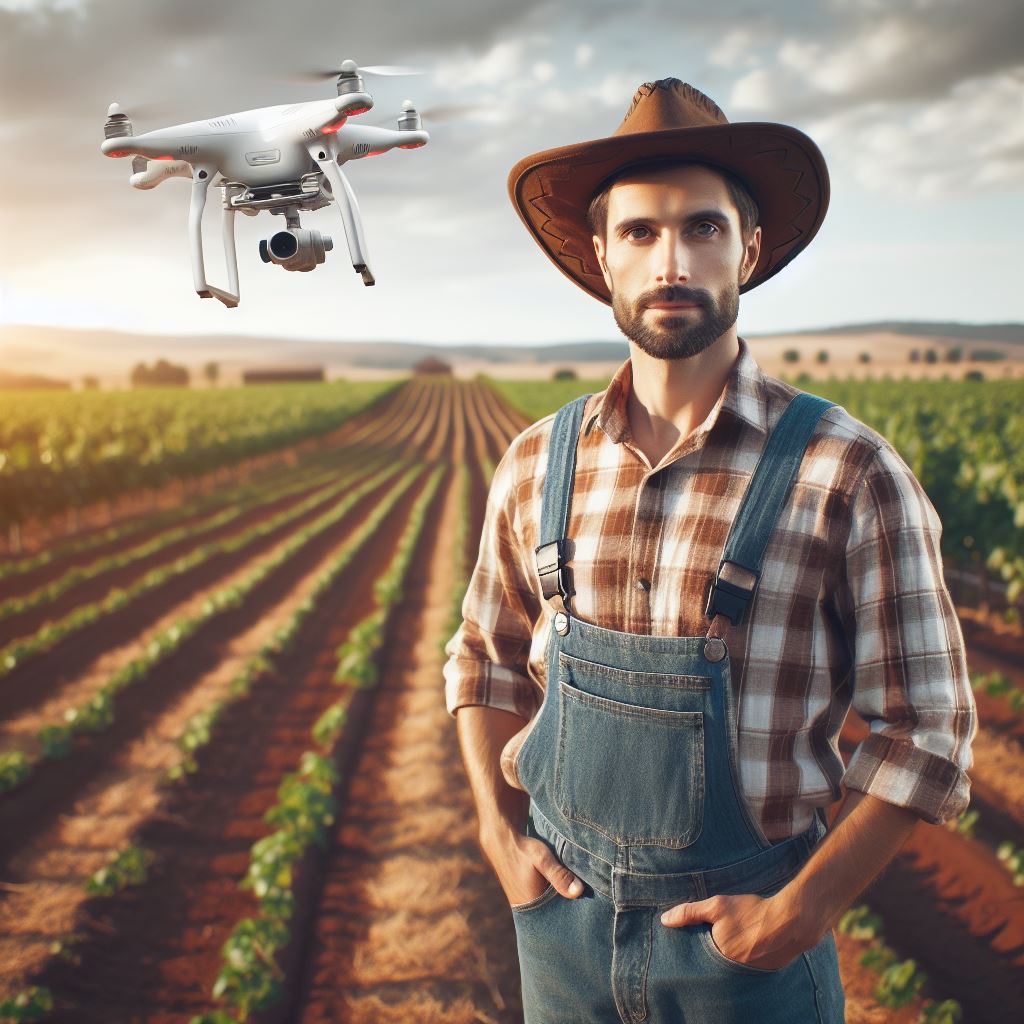
Find Out More: Eco-Friendly Agri-Tech: Startups Leading the Way
Uncover the Details: Agri IoT: Smart Solutions for Farmers
Challenges and Limitations of AI in Crop Management
While AI shows great promise in revolutionizing crop management, there are several challenges and limitations that need to be addressed:
Need for Data Collection and Analysis
- Data collection is essential for training AI models, but gathering accurate and relevant data can be challenging.
- Analysis of large datasets requires significant computational resources and expertise.
- Furthermore, obtaining real-time data on weather, soil conditions, and crop health can be expensive.
- Without proper data collection and analysis, AI systems may not perform optimally.
Initial Investment Cost
- Implementing AI technologies in crop management can be expensive, particularly for small-scale farmers.
- The cost of acquiring AI systems, sensors, and other necessary equipment can hinder adoption.
- Additionally, there may be a need for infrastructure development to support AI-based applications on farms.
- To overcome this challenge, governments and organizations must provide financial support and incentives.
Dependence on Accurate Algorithms and Models
- AI algorithms and models need to be precise and reliable to provide accurate recommendations and predictions.
- Developing robust algorithms requires extensive research, calibration, and validation.
- Mistakes or inaccuracies in algorithm design can lead to incorrect decisions, negatively impacting crop management.
- It is crucial to continuously refine AI models to ensure their effectiveness and adaptability.
Ethical Considerations and Farmer Skill Gap
- AI-based crop management raises ethical concerns regarding data privacy, ownership, and decision-making.
- There is a need for clear regulations to protect farmers’ rights and prevent exploitation of their data.
- Moreover, many farmers may lack the necessary skills and expertise to effectively use AI technologies.
- Training programs and workshops should be conducted to bridge the skill gap and enhance adoption.
In a nutshell, while AI offers tremendous potential in crop management, there are several challenges that need to be addressed.
Data collection and analysis, initial investment cost, dependence on accurate algorithms and models, and ethical considerations, as well as the farmer skill gap, are key areas that require attention.
By overcoming these challenges, AI can play a significant role in optimizing agricultural practices and ensuring sustainable crop production.
Read: Moisture Sensors: Boosting Crop Yields
Future Prospects of AI in Crop Management
Artificial Intelligence (AI) has the potential to revolutionize crop management in the coming years.
With advancements in AI technology, farmers and agriculture professionals can benefit from its various applications and the immense impact it can have on the industry.
Advancements in AI Technology and its Potential Impact
AI technology is continuously evolving, and it is becoming increasingly sophisticated in analyzing and interpreting data.
Its ability to process vast amounts of information allows for more accurate and efficient decision-making in crop management.
- AI can analyze climate patterns, soil composition, and other environmental factors to optimize crop production.
- It can provide real-time monitoring and analysis of plant health, enabling early detection and prevention of diseases.
- AI-powered drones and robots can be used for precise planting, irrigation, and harvesting.
- Machine learning algorithms can predict crop yields and optimize resource allocation.
Integration of AI with Other Emerging Technologies (e.g., IoT)
The integration of AI with other emerging technologies, such as the Internet of Things (IoT), further enhances its potential in crop management.
- IoT devices can collect data from sensors placed in fields and transmit it to AI systems for analysis.
- This integration enables AI to make data-driven decisions and automate tasks, increasing productivity and reducing costs.
- Farmers can remotely monitor and control irrigation systems, temperature, and humidity levels in greenhouses using AI and IoT.
Opportunities for Sustainable and Eco-friendly Practices
AI-driven crop management opens up opportunities for implementing sustainable and eco-friendly practices in agriculture.
- AI can optimize the use of resources, such as water and fertilizers, by precisely determining the required amounts.
- It can minimize chemical usage through targeted pest management and disease prevention strategies.
- By reducing waste and optimizing production, AI can contribute to environmental sustainability.
Potential for Transforming Global Agriculture
The integration of AI in crop management has the potential to transform global agriculture by addressing critical challenges and increasing food production.
- AI can help tackle the increasing global demand for food by maximizing crop yields and minimizing losses.
- It can assist farmers in adapting to climate change by providing data-driven insights for resilient crop management.
- AI-powered agriculture systems can enable small-scale farmers to access advanced technology and improve their livelihoods.
- The use of AI in crop management can contribute to food security and more efficient farming practices on a global scale.
In summary, AI holds tremendous potential in the future of crop management. With advancements in technology and the integration of AI with other emerging technologies, the agricultural industry can benefit from more sustainable, efficient, and productive practices.
By leveraging AI’s capabilities, farmers can optimize resource usage, increase yields, and contribute to the transformation of global agriculture.
Conclusion
AI has proven to bring numerous benefits and applications to crop management.
It has revolutionized agriculture by optimizing resource allocation, enhancing yield prediction, and improving pest and disease detection.
The importance of embracing AI for future agriculture cannot be emphasized enough.
The technology has the potential to address global food challenges and ensure sustainable farming practices.
Farmers should not hesitate to explore AI solutions in crop management to stay competitive and maximize their productivity.

